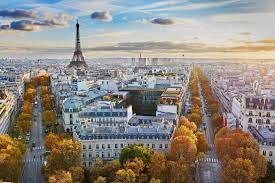Dubai

The UAE culture mainly revolves around the religion of Islam and traditional Arab culture. The influence of Islamic and Arab culture on its architecture, music, attire, cuisine and lifestyle are very prominent as well. Five times every day, Muslims are called to prayer from the minarets of mosques which are scattered around the country. Since 2006, the weekend has been Friday-Saturday, as a compromise between Friday's holiness to Muslims and the Western weekend Saturday-Sunday.[195] Prior to 2006, the weekend was Thursday-Friday.
Geography

Dubai is situated on the Persian Gulf coast of the United Arab Emirates and is roughly at sea level (16 m or 52 ft above). The emirate of Dubai shares borders with Abu Dhabi in the south, Sharjah in the northeast, and the Sultanate of Oman in the southeast. Hatta, a minor exclave of the emirate, is surrounded on three sides by Oman and by the emirates of Ajman (in the west) and Ras Al Khaimah (in the north). The Persian Gulf borders the western coast of the emirate. Dubai is positioned at 25.2697°N 55.3095°E and covers an area of 1,588 sq mi (4,110 km2), which represents a significant expansion beyond its initial 1,500 sq mi (3,900 km2) designation due to land reclamation from the sea.[citation needed] Dubai lies directly within the Arabian Desert. However, the topography of Dubai is significantly different from that of the southern portion of the UAE in that much of Dubai's landscape is highlighted by sandy desert patterns, while gravel deserts dominate much of the southern region of the country.[53] The sand consists mostly of crushed shell and coral and is fine, clean and white. East of the city, the salt-crusted coastal plains, known as sabkha, give way to a north-south running line of dunes. Farther east, the dunes grow larger and are tinged red with iron oxide
Religion
Article 7 of the UAE's Provisional Constitution declares Islam the official state religion of the UAE. The government subsidises almost 95% of mosques and employs all Imams; approximately 5% of mosques are entirely private, and several large mosques have large private endowments. [109] All mosques in Dubai are managed by the Islamic Affairs and Charitable Activities Department also known as "Awqaf" under the Government of Dubai and all Imams are appointed by the Government.[110] Any person held preaching racism, religious hatred or promoting religious extremism is usually jailed and deported
Economy

One of the world's fastest growing economies,[115] Dubai's gross domestic product is projected at US$107.1 billion, with a growth rate of 6.1% in 2014.[116] Although a number of core elements of Dubai's trading infrastructure were built on the back of the oil industry,[117] revenues from oil and natural gas account for less than 5% of the emirate's revenues.[11] It is estimated that Dubai produces 50,000 to 70,000 barrels (7,900 to 11,100 m3) of oil a day[118] and substantial quantities of gas from offshore fields. The emirate's share in the UAE's total gas revenues is about 2%. Dubai's oil reserves have diminished significantly and are expected to be exhausted in 20 years. Real estate and construction (22.6%),[13] trade (16%), entrepôt (15%) and financial services (11%) are the largest contributors to Dubai's economy.[120] Dubai's non-oil foreign trade stood at $362 billion in 2014. Of the overall trade volumes, imports had the biggest share with a value of $230 billion while exports and re-exports to the emirate stood at $31 billion and $101 billion respectively.By 2014, China had emerged as Dubai's largest international trading partner, with a total of $47.7 billion in trade flows, up 29% from 2013. India was second among Dubai's key trading partners with a trade of $29.7 billion, followed by the United States at $22. 62 billion. The Kingdom of Saudi Arabia was Dubai's fourth trading partner globally and first in the GCC and Arab world with a total trade value of $14.2 billion. Trade with Germany in 2014 totalled $12.3, Switzerland and Japan both at $11.72 billion and UK trade totalled $10.9 billion
Sports



